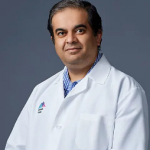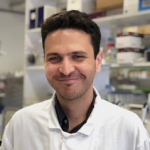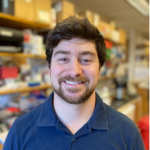 Saurabh Mehandru, MD straddles the world of clinical care and laboratory-based investigation. He graduated from the University College of Medical Sciences, Delhi University, India and then completed residency training in Internal Medicine at the NYU School of Medicine where he also served as Medical Chief Resident. He received subspecialty training in Clinical Gastroenterology at The Icahn School of Medicine at Mount Sinai. Dr. Mehandru undertook post-doctoral training at the Rockefeller University, first working in the Laboratory of Dr. David Ho (with Dr. Martin Markowitz) and then in the Laboratory of Dr. Ralph Steinman, Nobel Laureate in Physiology or Medicine (2011). After finishing his post-doctoral training, Dr. Mehandru was invited to join the faculty at Mount Sinai where in addition to serving as an Associate Professor of Gastroenterology, he leads a laboratory of Mucosal Immunology since 2013. Dr. Mehandru is an NIH-funded investigator who has received multiple awards. He was nominated to the American Society of Clinical Investigation (ASCI) in 2022.
Saurabh Mehandru, MD straddles the world of clinical care and laboratory-based investigation. He graduated from the University College of Medical Sciences, Delhi University, India and then completed residency training in Internal Medicine at the NYU School of Medicine where he also served as Medical Chief Resident. He received subspecialty training in Clinical Gastroenterology at The Icahn School of Medicine at Mount Sinai. Dr. Mehandru undertook post-doctoral training at the Rockefeller University, first working in the Laboratory of Dr. David Ho (with Dr. Martin Markowitz) and then in the Laboratory of Dr. Ralph Steinman, Nobel Laureate in Physiology or Medicine (2011). After finishing his post-doctoral training, Dr. Mehandru was invited to join the faculty at Mount Sinai where in addition to serving as an Associate Professor of Gastroenterology, he leads a laboratory of Mucosal Immunology since 2013. Dr. Mehandru is an NIH-funded investigator who has received multiple awards. He was nominated to the American Society of Clinical Investigation (ASCI) in 2022.
Pablo Canales-Herrerias, PhD is an immunologist from Mexico City, where he did his undergraduate studies in Biology at the National University (UNAM). Dr. Canales-Herrerias first discovered Immunology during his MSc in the lab of Prof. Daniel Peterson (Johns Hopkins University), working on IgA responses in the gut. After that, he decided to get my PhD in immunology at the Pasteur Institute (France), where he trained with Prof. Pierre Bruhns and Prof. Jean Baudry. His project was aimed at characterizing autoreactive plasma cells form patients with autoimmune disorders, using a novel single-cell microfluidic platform. Currently, Dr. Canales-Herrerias works a postdoctoral fellow at the Icahn School of Medicine at Mount Sinai under the mentorship of Prof. Saurabh Mehandru and Prof. Andrea Cerutti. Dr. Canales-Herrerias has two main lines of research: (i) to investigate the effects of HIV infection on the intestinal immune system, which persist even under ART therapy, and to better understand the association of this insult with the development of extraintestinal comorbidities. Second (ii), he is investigating the impact of the α4β7-MAdCAM1 axis on intestinal inflammation and its implications for therapeutic strategies. In particular, he is interested in understanding the role of B cell homing to intestinal sites in the development of inflammatory bowel disease.
 Francesca Cossarini, MD is an early career physician-scientist in the Division of Infectious Diseases at Icahn School of Medicine at Mount Sinai. She graduated from medical school at the Universita’ degli Studi di Trieste, Italy and worked as a clinical research investigator at the Universita’ Vita-Salute San Raffaele in Milan, Italy where she focused on antiretroviral treatment and clinical outcomes of HIV-infected patients. She spent a research year working on HIV reservoir in the Frank Maldarelli Lab at the NIH and then completed her medicine residency at Albert Einstein College of Medicine – Jacobi Hospital in New York where she worked on a project to improve HIV screening strategies in patients accessing medical care. She joined the Mehandru Lab during her Infectious Disease Fellowship at the Icahn School of Medicine at Mount Sinai and her work focuses on the host-immune responses during HIV infection, and the role of the gut-associated lymphoid tissue in the HIV reservoir.
Francesca Cossarini, MD is an early career physician-scientist in the Division of Infectious Diseases at Icahn School of Medicine at Mount Sinai. She graduated from medical school at the Universita’ degli Studi di Trieste, Italy and worked as a clinical research investigator at the Universita’ Vita-Salute San Raffaele in Milan, Italy where she focused on antiretroviral treatment and clinical outcomes of HIV-infected patients. She spent a research year working on HIV reservoir in the Frank Maldarelli Lab at the NIH and then completed her medicine residency at Albert Einstein College of Medicine – Jacobi Hospital in New York where she worked on a project to improve HIV screening strategies in patients accessing medical care. She joined the Mehandru Lab during her Infectious Disease Fellowship at the Icahn School of Medicine at Mount Sinai and her work focuses on the host-immune responses during HIV infection, and the role of the gut-associated lymphoid tissue in the HIV reservoir.
Arno Bourgonje, MD, PhD is a Postdoctoral Fellow in the Division of Gastroenterology at the Icahn School of Medicine at Mount Sinai. Dr. Bourgonje obtained his B.Sc. in Medicine summa cum laude (2016) and subsequently completed his MD/PhD trajectory (MD: 2020, summa cum laude; PhD: 2023, cum laude) at the University of Groningen and University Medical Center Groningen, the Netherlands. His PhD focused on the identification of novel biomarker signatures for patients with inflammatory bowel diseases (IBD) through exploration of multiple biological systems (e.g., the immune system and gut microbiome) and -mechanisms (e.g., oxidative stress and inflammation). In 2023, he was awarded with the prestigious NWO Rubicon fellowship, upon which he joined the Icahn School of Medicine at Mount Sinai to continue his work on identifying biomarker signatures of patients with IBD under the mentorship of prof. Saurabh Mehandru and prof. Jean-Frederic Colombel. Leveraging various multi-omics technologies (e.g., phage-display immunoprecipitation sequencing, PhIP-Seq) he aims to interrogate human immune system alterations in IBD and identify novel biomarkers for early diagnosis, disease complications and long-term disease prognosis of patients with IBD.
Alexandra Livanos, MD, PhD is a physician-scientist in the Division of Gastroenterology at the Icahn School of Medicine at Mount Sinai, specializing in inflammatory bowel disease (IBD). She completed her MD/PhD at New York University, with her PhD focusing on the role of early-life gut microbiome perturbation on the development of type 1 diabetes in non-obese diabetic (NOD) mice under the mentorship of Dr. Martin Blaser. Subsequently, she completed her internal medicine residency at NYP-Columbia and her gastroenterology fellowship at the Icahn School of Medicine at Mount Sinai (Mount Sinai Hospital). Her current research focuses on predicting the development of IBD and early events in disease pathogenesis, with a focus on the interactions among the gut mucosal immune system, the epithelium and the stroma.
Matthew Taylor, BS is an Associate Researcher in the Division of Gastroenterology at the Icahn School of Medicine at Mount Sinai. He graduated for the University of Notre Dame with a Bachelor of Science in Biology. He serves as both the Lab Manager and Lab Safety Officer in the Mehandru Lab. He is studying bacterial translocation in patients with acute severe ulcerative colitis (ASUC).
Divya Jha, PhD is a senior Postdoctoral Fellow in the Division of Gastroenterology at the Icahn School of Medicine at Mount Sinai. Dr. Jha obtained her undergraduate degree from Miranda House, University of Delhi and postgraduate degree in Biomedical Science from University of Delhi, India. She was awarded her PhD degree at the National Institute of Immunology, New Delhi, where she studied nanoparticle and spray-dried alum adjuvanted vaccine induced immune response in animal models. She joined the Cardiovascular Research Centre at Mount Sinai to investigate the role of an m6A demethylase FTO (fat mass and obesity-associated protein) and the use of extracellular vesicle–encapsulated AAVs (EV-AAVs) as cardiac gene delivery vector in cardiovascular diseases. In the Mehandru laboratory, she worked on understanding the role of intestinal host response to SARS-CoV-2 virus. Currently, she works on deciphering the roles of immune cells within the epithelium and of tissue resident memory T cells in the intestinal tissues of patients with inflammatory bowel diseases and study their associations with response to therapeutics. She also works on studying immune dysregulation in the gut tissues of patients with graft vs. host disease.
Hannah Bloemen, MD is a research fellow in the Division of Gastroenterology at the Icahn School of Medicine at Mount Sinai studying the presence and role of specific antibodies in patients with primary sclerosing cholangitis and inflammatory bowel disease. She graduated from medical school at the Catholic University of Leuven, Belgium and started residency in Internal Medicine in the Netherlands with the ultimate goal of becoming a gastroenterologist. Hannah is currently taking two scholarly years to focus on IBD-related research.
Danielle Ganjian, BS is a medical student at Tel Aviv University Faculty of Medicine’s NY State/American Program, currently completing a research fellowship in the Division of Gastroenterology at the Icahn School of Medicine at Mount Sinai. Prior to medical school, she completed her Bachelor of Science at Northeastern University, where she double majored in biology and linguistics. She is currently studying mucosal immunological alterations in immune-mediated diseases.
Michael Tankelevich, BS is an Associate Researcher in the Division of Gastroenterology at the Icahn School of Medicine at Mount Sinai. His primary role is clinical research coordinator. Holding a bachelor’s degree in biochemistry from CUNY Hunter College, his foundational lab experience was centered around the study of biological and synthetic peptides in the field of structural biochemistry. While his core responsibilities in the Mehandru Lab are based in clinical research, he also plays an instrumental role in the biological study of pouchitis in patients with ulcerative colitis. Looking ahead, he harbors a growing passion for bioinformatics and statistics as potential future career paths.








